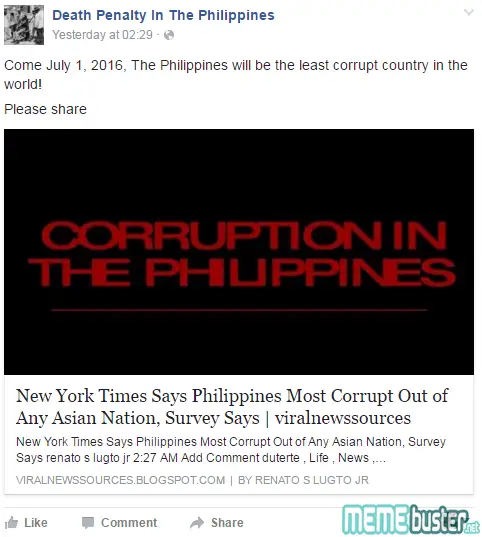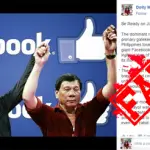An article touting Philippines as the most corrupt country in Asia, according to New York Times, has been circulating online. And this particular Facebook post claimed that once the administration changes this July 1, 2016, “the Philippines will be the least corrupt country in the world!”

The link in the post leads to an article in a viral news site, but further checking revealed so much more behind this article. Did the Philippines really rank as the most corrupt Asian country in 2015?
Well, we found an Inquirer article that can give us a better understanding of this issue.
It turned out that the article claiming the Philippines as the most corrupt among Asian countries in 2015 was written by a certain Timothy Walker for his site, PhilippinesLifestyle.com, on August 15, 2015.
However, there were noticeable similar lines that you can find between Walker’s article and a New York Times article published on March 3, 2007, entitled “Philippines most corrupt, survey says,” written by Carlos H. Conde.
[ads1]
Walker wrote:
“Under the shadow of a new survey, the New York Times considers the Philippines as the most corrupt country in the Asian region. The survey released on Tuesday said that Singapore ranked as one of the least corrupt of the 13 Asian economies surveyed – the second least corrupt was Hong Kong and the third was Japan.
This is almost similar to this paragraph from Conde’s article:
Expatriate businessmen in Asia perceive the Philippines as the most corrupt country in the region, according to a survey released Tuesday.
Singapore was ranked as the least corrupt of the 13 economies surveyed, followed by Hong Kong and Japan, according to the annual corruption survey conducted by the Political and Economic Risk Consultancy, based in Hong Kong.
Walker’s article also copied this off Conde’s article:
“The Philippines has the distinction of being perceived in the worst light this year,” the survey stated. “People are just growing tired of the inaction and insincerity of leading officials when they promise to fight corruption.”
Walker simply changed the placement of some words.
However, the most significant change that Walker did to make his article appear like the survey was made in 2015 instead of in 2007 was when he wrote this paragraph:
“In all, the survey was conducted in over a two month period at the beginning of 2015 and questioned 1,476 expat executives in the 13 countries and territories throughout Asia.
The Philippines scored 9.40 out of 10 on corruption, giving it the number one spot.
In 2006, the same survey gave the most corrupt nation to Indonesia – in that same year, the Philippines scored a 7.80 – Indonesia was still high in corruption in 2015 with an overall score of 8.03.
The survey however said that the Philippines, Thailand and Indonesia were systematic in corruption saying in fact they were all just about as bad as one another.”
But this is just a rehash of what Conde wrote in 2007:
“The survey, conducted in January and February, queried 1,476 expatriate executives in 13 countries and territories in Asia. The Philippines scored 9.40, where a score of zero is the least corrupt and 10 is the most corrupt.
In the 2006 survey, in which Indonesia was regarded as the most corrupt, the Philippines scored 7.80. Indonesia improved its score to 8.03 this year, a development that the report credits to a government anti-corruption campaign.
The report noted, however, that for the Philippines, Indonesia and Thailand, where corruption is systemic, “it is really splitting hairs to say which one has a worse problem.”
The rest of Walker’s article is almost similar Conde’s article.
The Inquirer also pointed out Forbes contributor Ralph Jennings’ article posted on March 2, 2015, entitled “Why Graft Is Declining In The Notoriously Corrupt Philippines.”
The article wrote how corruption is declining in the Philippines, with a Barclays regional economist in Singapore, commenting on how “systems and processes have become more transparent,” which have been shown in government projects.
Based on interviews with trade experts and business executives, the article attributed the improvement in the issue of the corruption more to the use of social media than to Aquino, though, who some netizens were quick to blame when Walker’s article came out. It said that with social media and smartphone cameras, it is easier for people to expose things, including the politicians’ dirty laundry.
And according to Asian Correspondent’s article “Singapore remains least corrupt country in Asia; NKorea most corrupt” that was posted on January 27, 2016, it’s not the Philippines that was most corrupt. This is based on the Corruption Perceptions Index (CPI) for 2015 of the anti-corruption watchdog Transparency International. The ranking is based on the perception of corruption, not the actual corruption in a country that is “impossible to quantify.”
Globally, Singapore ranked 8th, while the Philippines ranked 95th. North Korea, Asia’s most corrupt, ranked 167th place around the world, the same ranking it held in 2014.
With reported improvement in the corruption problem in the Philippines and the CPI showing North Korea as the most corrupt Asian nation and the fact that Walker plagiarized that his article to make it seem like the survey was conducted in 2015, Walker’s article should be ignored, despite it being picked up by so many viral news sites and shared over and over again on Facebook by users who don’t bother verifying their sources.
[ads3]
Be Informed. Beat the Trolls, Share the Truth!


